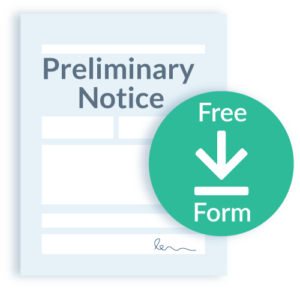Private projects
Generally, no Preliminary Notice is required.
However, on residential projects, the GC should file and serve a Notice of Unpaid Balance and Right to File Lien to retain the right to file a lien if necessary.
Generally, no Preliminary Notice is required.
However, on residential projects, the GC should file and serve a Notice of Unpaid Balance and Right to File Lien to retain the right to file a lien if necessary.
Preliminary notice not required.
Since GCs will not make a claim against their own bond for non-payment, they do not have bond claim rights, and have no preliminary notice requirement.
Subcontractors and suppliers must send notice.
Notice of Unpaid Balance is due within 60 days of last furnishing on residential projects for a project participant to retain the right to file a lien if necessary.
Subcontractors and suppliers must send notice.
Preliminary notice is required for all parties who didn't contract with either the public entity or the GC.
Non-residential projects
A preliminary notice isn’t required to secure lien rights, but does have its advantages. When a Notice of Unpaid Balance & Right to Lien (NUB) is filed, a mechanics lien will ensure priority over other encumbrances to the property, or buyers, if the transaction occurs subsequent to the filing of the notice.
Residential projects
Every potential claimant must file and serve a Notice of Unpaid Balance & Right to Lien on residential projects to be able to file a New Jersey mechanics lien. Furthermore, claimants must also serve a demand for arbitration (with the American Arbitration Association or other ADR party if specified in the contract), and include a completed and signed copy of the Notice of Unpaid Balance and Right to Lien and an affidavit that the notice has been lodged for record.
• For more on the NJ residential liens see: New Jersey Residential Mechanics Liens- A Convoluted Process
Non-residential projects
If the claimant chooses to send notice, it may be filed any time before the lien claim is filed; therefore at least 90 days after last furnishing labor and/or materials to the project.
Residential projects
On residential projects, notice must be sent within 60 days of last furnishing labor and/or materials to the project. Once filed, a copy of the recorded Notice of Unpaid Balance & Right to Lien, an affidavit proving the notice was filed, and a demand for arbitration must be sent within 10 days.
Non-residential projects
On non-residential projects, notice only needs to be filed with the county clerk’s office in the county where the property is located. However, it’s a good idea to send a copy to the property owner and general contractor (if applicable) as well.
Residential projects
The notice on residential projects must be filed with the county clerk’s office in the county where the property is located, all parties up the contracting chain, and the American Arbitration Association (or other ADR party if agreed-upon).
Be careful when the owner (on a residential or commercial project) is a business entity, see: Sending Notice to Corporations in New Jersey
A Notice of Unpaid Balance & Right to Lien should include all of the required language under NJ Stat. §2A-44A-20(b)(1) and contain the following information:
• Claimant’s name & address (and name of business entity if applicable)
• Property owner’s name
• Property description (including block & lot numbers)
• Amount claimed (amount calculated with the formula provided in the form)
• Interest the lien is claimed against (owner, unit owner, community association, etc.)
• Date of contract
• Hiring party name & address
• Description of labor and/or materials provided
• Last date of furnishing
• Identification whether the project is residential or not
• Signed and notarized
→ Download a free New Jersey Notice of Unpaid Balance & Right to Lien form
Non-residential projects
The notice only needs to be filed with the county clerk’s office in the county where the property is located. You can find a list of all the New Jersey county recorder’s offices here. It may be delivered to the property owner or any other interested party, but it is not required.
Residential projects
For residential projects, the notice must be lodged for record with the county clerk in the county in which the property is located, and must be served on the property owner and all parties “up-the-chain” by certified mail, return receipt requested, AND by regular mail.
In New Jersey, notices are considered delivered when sent by certified mail. However, on non-residential projects, the notice is effective for priority purposes from the date it is lodged for record.
Non-residential projects
For non-residential projects the failure to file a preliminary notice has no effect on the ability of the lien claimant to file a mechanics lien. It will only affect priority if there are other encumbrances on, or transfers of, the property.
Residential projects
Failure to timely file and serve the preliminary notice on residential projects is fatal to the lien claim.
Bond claims
All claimants who didn’t contract directly with the prime contractor who furnished the bond must send a preliminary notice to have the right to make a claim against the public payment bond in New Jersey.
• A copy of the bond should be requested to determine if there are any other notice requirements
Lien on contract funds
Every claimant must send a preliminary notice to file a lien on contract funds. Note, that this remedy isn’t available for any state or state agency commissioned projects.
Bond claims
Preliminary notice must be given prior to the commencement of work.
Lien on contract funds
Notice must be served no later than 20 days after the date of first furnishing labor and/or materials to the project.
Bond claims
Notice must be provided to the general contractor who posted the payment bond on the project.
Lien on contract funds
Preliminary notice must be filed with the either the municipal clerk, the chief financial officer of the county or the chairman of the commission, board or authority who commissioned the work.
Bond claims
The statutes do not provide much guidance on the contents of this notice beyond, “provide written notice… that said person is a beneficiary of the bond.” Therefore, best practice is to include all of the required information for the notice below, and include a statement that the claimant is a beneficiary of the bond.
Lien on contract funds
A New Jersey Notice of Delivery of Labor or Materials on municipal projects should contain the following information:
• Claimant’s name, address, & phone number
• Hiring party’s name
• Date of first furnishing or anticipated date of commencement
• Description of labor and/or materials to be furnished
→ Download a free NJ Notice of Delivery of Labor or Materials here
Bond claims
Preliminary notice must be sent by certified mail (or other method of delivery provided that the claimant has proof of the delivery of the notice).
Lien on contract funds
The preliminary notice of a claimant making a claim on the contract funds must be filed with the either the municipal clerk, the chief financial officer of the county or the chairman of the commission, board or authority who commissioned the work.
Both notices are considered served when actually received or filed with the public entity.
If either notice is served late, it is not fatal to the claimant’s rights. However, the amount of protection will be limited to the value of labor and/or materials provided from the date the notice was served, and everything thereafter.
Ms. Tran,
Please take a look at this:
https://www.levelset.com/preliminary-notice/new-jersey-preliminary-notice-faqs/#:~:text=Generally%2C%20no%20Preliminary%20Notice%20is,file%20a%20lien%20if%20necessary.
The first question is what type of project was being built and who owns the real estate. NJ has separate statutes for public and private projects. If the project was included any type of residential purpose (apartments, condos, etc.), the Notice of Unpaid Balance (the "NUB") would need to be filed not later than 60 days since your company delivered materials to the property on which you are trying to file the lien claim. After filing the NUB, your company would then need to file for arbitration with the American Arbitration Association.
If the project did not involve a residential use, then the preliminary notice simply provides potential advantages in terms of the order/priority of the lien against the property title. If it's a public project, the NJ Municipal Mechanics Lien Law is not actually a lien. It's just a reservation of claim against the allotted public funds.
Please feel free to reach out, if I could be further assistance.
Thanks,
Colin Schmitt
cschmittlaw@gmail.com
609.400.1006
For residential construction a Notice of Unpaid Balance and Right to File Lien (NUB) must be filed within 60 days following the date the lien claimant last performed work or supplied services, material, or equipment to the residential real property for which payment is claimed. The lien claim must be filed no later than ten days following any arbitration decision or within 120 days following the last date the lien claimant performed work or provided services, materials, or equipment according to a written residential construction contract.
New Jersey has a relatively odd preliminary notice scheme, mostly because of the extremely ponderous and frustrating procedure related to potential lien claims on residential property.
Whether a New Jersey preliminary notice (usually called a notice of unpaid balance and right to lien) is strictly required depends on the project type. The only construction projects that specifically require preliminary notice in New Jersey are residential project. These notices balance on the line between “preliminary notices” and “notices of intent to lien” given the deadline of after work is performed, and the designation as a notice of “unpaid balance.” The deadline to file a Notice of Unpaid Balance and Right to Claim Lien on a residential project is 60 days after the last day on which the project participant provided labor or materials.
Unlike most other preliminary notices, the New Jersey notice of unpaid balance and right to claim lien is a filed document. This means that in order to be effective, the notice must be recorded with the county clerk’s office for the county in which the project was located as well as being served on the property owner. But, for residential projects, the process doesn’t stop there. A demand for arbitration (along with a copy of the filed notice of unpaid balance, and an affidavit that the arbitration demand was served within 10 days of the date the notice of unpaid balance was filed), must be filed in order for a project participant to later qualify for mechanics lien protection.
While not specifically required, it is also generally a good idea for a project participant to file a notice of unpaid balance on non-residential projects. While sending a non-required “visibility” notice is always a good idea at the start of a project, filing a notice of unpaid balance can have tangible benefits related to a claimant lien rights. The filing of a notice of unpaid balance will give a mechanics lien priority over other encumbrances to the property, or buyers, if the transaction occurs subsequently to the filing of the notice. Additionally, if a preliminary notice is filed prior to the recording of the permanent financing, the mechanics lien will have priority over the permanent mortgage, but not over the construction mortgage.

Mechanics lien law in New Jersey is very specific about the language and information that must be included in the notice. Follow these links to find the generic preliminary notice form, the notice of unpaid balance and right to file lien form, and the New Jersey public subcontractor notice form for free.
Our free forms were written by construction attorneys to meet the requirements under New Jersey statutes, making it easy to get this part right.

Be careful to get this part right! Making a mistake when preparing your preliminary notice form could forfeit your right to file a New Jersey mechanics lien down the line. Verify all of the information to ensure that it’s completely accurate.

In New Jersey, preliminary notices must be filed with the county clerk before you send them. Non-residential projects don’t require you to serve your notice on the owner – simply file it with the clerk and you’re good to go.
On residential projects, file the notice with the clerk and serve it on the owner and GC afterwards. The notice must be sent BOTH by regular mail and certified mail, return receipt requested.
Select Preliminary Notice document.
Provide basic job information.
Levelset sends the document for you. Postage included!